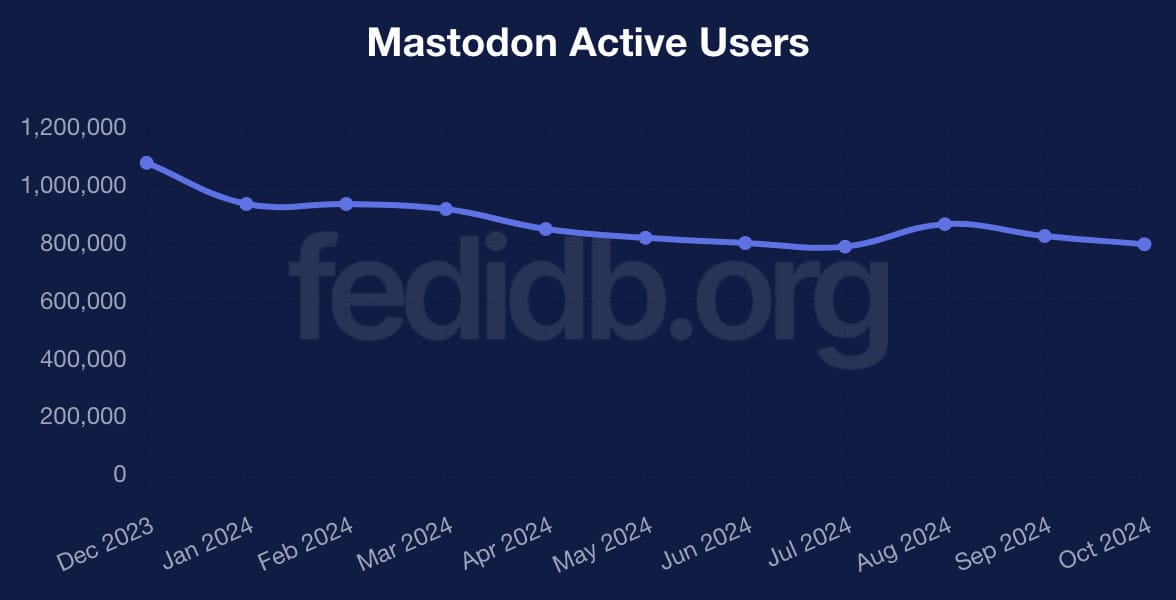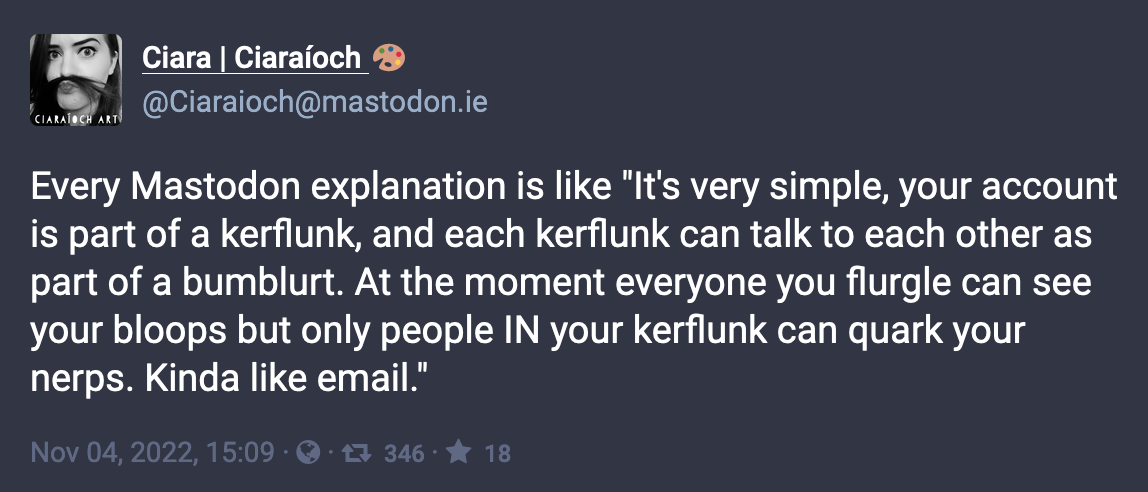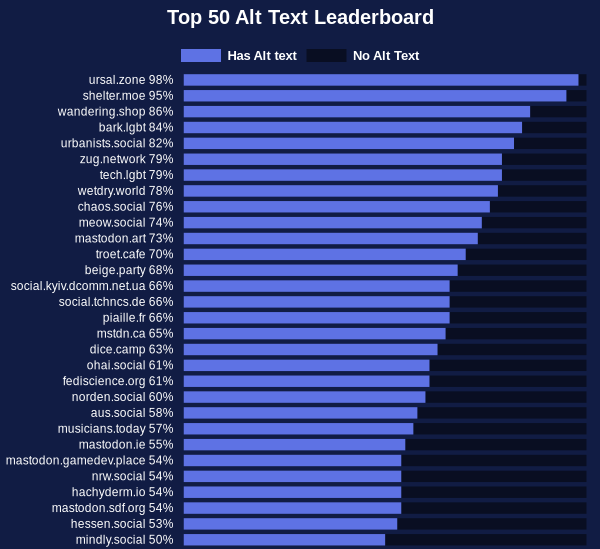A faux "Eternal September" turns into flatness
Part 3 of Mastodon, two years later

Previous posts in the series: Mastodon, two years later and A tale of two prototypes.
Contents
- Intro
- It's not "just like email"
- Usability and gatekeeping weren't the only challenges newcomers faced
- The first complicated high-stakes decision is even before you sign up
- Why not help people choose an instance that's a good fit?
- But no
.......
"I’m focusing today’s issue on one of the most common refrains about the elephant site: that it’s in the midst of an Eternal September."
– Ernie Smith, Mastodon Isn’t Facing an Eternal September. Here’s Why Tedium, November 2022
The millions of new users flocking to Mastodon in late 2022 reminded many people of Usenet's (misremembered) "Eternal September" back in 1993-4 – although as Smith describes, there were some significant differences. Of course, just like the old influx to Usenet as new college students discovered it every September, the initial late-2022 wave ebbed quickly. Mastodon Benevolent Dictator for Life (BDFL) Eugen Rochko's March 2023 claim that "in fact it’s growing faster now than it was" was, um, in retrospect overoptimistic. By late 2023, growth had turned to flatness.
Still, once numbers stabilized, Mastodon had over 1.2 million active users – double the pre-acquisition numbers. As Cory Doctorow noted in Of Course Mastodon Lost Users (February 2023),
"This is perfectly normal: new services always experience “scalloped” growth15.... Make no mistake, there will be future Fediverse surges."
And sure enough, Mastodon experienced another (smaller) surge in June/July 2023, when Xitter briefly turned on rate limits and Reddit declared war on its volunteer moderators and third-party developers.
But the landscape was changing: Bluesky started limited testing in March 2023; by later that year it was easy to get an invitation code, and in February 2024 they opened for a public beta – no invitation required. As I said in A tale of two prototypes (October 2024)
"Bluesky's a better decentralized Twitter alternative than Mastodon; Threads is much easier for people who already have Instagram accounts to try out. Both have much bigger budgets than Mastodon, so it'll be a challenge to catch up."
So even though Apartheid Clyde has continued doing things that drive people away (BTS ARMY in July 2024, Brazil in August 2024, October 2024's announcement of a change to the block functionality to make it easier for stalkers, harassers, and bots to target people) ... the surges are going to Bluesky instead.
Of course, there's a lot more to social networking than Twitter alternatives. But Rochko's vision for Mastodon is a Twitter alternative, and that's how it's usually decribed in the press. Mastodon relied on surges from Twitter for its growth.
Without any surges, Mastodon's flatness has continued throughout the first ten months of 2024.
It's not "just like email"

Accuracy aside, the analogy to Eternal September highlights the gatekeeping16 and disdainful attitude many (although certainly not all) long-time Mastodonians had for newcomers. In The Year September Never Ended in net.wars (1997), Wendy Grossman had noted that “AOLers weren’t (necessarily) stupid; they were software-disadvantaged." The same is true for newcomers to Mastodon. Mastodon's official mobile apps are medicore, and Mastodon's web UI has some very rough edges and counter-intuitive functionality – even for somebody like me who's been using it for years.
A personal example: in November 2022 I was trying to get the word out about an activism campaign and several people including the executive director of a well-known non-profit said they'd help. So, I DM'ed him and several others a link of a post I hoped they'd boost. Nobody boosted it! WTF!!!!
Eventually one of the people involved sheepishly told me that they couldn't figure out how to boost it. I had forgotten that when they clicked on the link it brought them not-logged-in tab, so there was no way to interact with it. Long-timers knew what to do in that situation: cut-and-paste it into the "explore" box in the tab where they already were logged in, and then you get a version you can boost.17 But for some reason it's not so intuitive to new years. Who could have predicted? It's very simple really ... kinda like email!
Doctorow characterized the belief that the Fediverse could never catch on because it's hard and Twitter is easy as a "fairy tale" ... but Erin Kissane's Mastodon is easy and fun except when it isn't (July 2023), which summarized experiences from Bluesky users who had tried Mastodon, has a lot of quotes from people who found Mastodon too confusing or too much work. As I said in Don’t tell people “it’s easy”, and seven more things Kbin, Lemmy, and the fediverse can learn from Mastodon (June 2023)
"Hopefully it will get easier over time but that hasn't happened yet with Mastodon. And yet, you constantly hear people talking about how easy it is – which implies that anybody who doesn't think it's easy must be stupid, incompetent, or doing something wrong.
This is not helpful. It's annoying and drives people away.
So don't say it."
But people, especially techie guys, kept saying it. Sigh.
Usability and gatekeeping weren't the only challenges newcomers faced

"It took me eight hours to get a pile of racist vitriol in response to some critiques of Mastodon."
– Dr. Johnathan Flowers, The Whiteness of Mastodon
It wasn't just the blatant racism that was a problem. As Erin Kissane notes in Mastodon is easy and fun except when it isn't, newcomers also encountered "unreasonable—or in several cases anti-trans or racist—expectations for content warnings."18 Also, reply guys. I'll talk about all of that in more detail in an upcoming post, but it's worth highlighting here as well.
And a lot of language about "Twitter refugees" echoed racist and anti-immigrant tropes .. all those loud, boisterous newcomers who don't know how to behave and don't understand our own much more civilized norms!18.1 Take Hugh Rundle's Home invasion - Mastodon’s Eternal September begins (November 2022), for example:
"It's not entirely the Twitter people's fault. They've been taught to behave in certain ways. To chase likes and retweets/boosts. To promote themselves. To perform.... People are pouring in to the quiet houseparty around the corner, cocktails still in hand, demanding that the music be turned up, walking mud into the carpet, and yelling over the top of the quiet conversation."
Of course, usabilty and (sometimes-racist) gatekeeping weren't the only reasons that people checking out Mastodon didn't stay. Kissane's work (also including Blue skies over Mastodon (April 2023), Notes From a Mastodon Migration and The affordance loop (both July 2023)) is a great window into the challenges newcomers face. As Kissane highlights
"None of this is lab-conditions research—sorry, I meant NONE OF THIS IS LAB-CONDITIONS RESEARCH—and I hope it’s obvious that there are shaping factors at every step."
Still, they're all worth reading, and the top themes Kissane lists in Mastodon is easy and fun except when it isn't were all things I heard a lot as well.
- got yelled at, felt bad
- couldn’t find people or interests, people didn’t stay
- too confusing, too much work, too intimidating
- too serious, too boring, anti-fun
- complicated high-stakes decisions
The first complicated high-stakes decision is even before you sign up
"Signing up means picking an instance, and the instance you’re on will, through its moderation actions and policies and its federation and defederation choices, define much of your experience on the fediverse, but instances currently distinguish themselves primarily by location, size, or nominal shared interests, rather than by a detailed and transparent discussion of those actual major experience differentiators.
– Erin Kissane, The affordance loop (July 2023)
The first complicated high-stakes decision people make when they join Mastodon (or more generally, the Fediverse) is what instance to choose. If you're on a good small-to-medium size instance Mastodon, Glitch, or Hometown instance with good moderation and people who share your interests and/or your idea of fun and can help you find apps and hashtags you might like (and deal with the confusing stuff), it can be a great experience.
Mastodon can still be a good experiences on other instances ... but statistically it's a lot less likely to be great – especially if you are a person of color. In fact, it can be pretty horrible. As Kissane says in The affordance loop
"If you’re a Black gay dude, say, and you stumble into choosing an instance that federates with known trollfarms and harassment hubs, and you make a post that reveals anything about your identity, you’re very likely to get flooded with some of the worst abuse anyone ever gets on the internet."
Similarly, for blind and low-vision people, Mastodon's much more likely to be a great experience on an instance where most images have alt-text (so are accessible to people using screenreaders). And much of Mastodon is really good about this!

Alas not all Mastodon instances have the same alt-text friendly culture. On the "flagship" instance mastodon.social, for example, 25% or fewer of the images have alt-text. Of course, even if you're on an instance like that which is relatively hostile to disabled people, you can overcome once you've done enough work to find the right people to follow. Still, first impressions matter a lot ...
Unfortunately, Mastodon doesn't give newcomers any help picking an instance.
- joinmastodon.org, the official landing page, lists a few hundred instances, and lets you search by region or topic, but only has a single sentence description for each.
- joinmastodon doesn't provide any information about how well-moderated an instance is (which makes a huge difference, especially for marginalized people) or what percentage of images on the instance have alt-text.
- There are some helpful directories and tools; fedi.garden, for example, is a small human-curated list of "nice, well run servers on Mastodon". But they're not easy for newcomers to find, and even if they do how does anybody who's not already experienced on the fediverse know whether to trust them or how to evaluate their recommendations?19
Why not help people choose an instance that's a good fit?
"It's hard to get settled into the fediverse for a set of distinct but interlocking reasons, starting with "How do I pick a server?"
– Erin Kissane, how to buy shoes in the fediverse, October 2024
As I said In When Moving to Mastodon, How Do You Pick The Right Instance?20 on WeDistribute, after a discussion of a half-dozen factors picking an instance, and links to ten different not-so-easy-to-find websites with useful resources,
"Yeah, it’d be a lot easier if a single site provided all of that functionality. Welcome to the Fediverse....
Newcomers are often told that it doesn’t matter what instance you’re on, or to just sign up for mastodon.social (the “flagship” instance, which is the default for mobile apps and spreadmastodon.com) and worry about it later. This is really horrible advice, because what instance you’re on has a big effect on your experience – and for most people, mastodon.social is not a good place to start."
Kissane's recent how to buy shoes in the fediverse and revealing the fediverse’s gifts have some great perspectives on this challenge. It's a hard problem in general ... still, there are some straightforward ways Mastodon could to make at least some progress:
- provide more information about and expand the different instances on the curated lists joinmastodon.org site
- link to a range of other curated lists
- provide links to instance catalogs like The Bad Space and Fediseer so people can find out something about the instances
- encourage people to look around at different instances
- make it easier for people to move between instances if their first choice doesn't work out
For that matter, Dr. Malka Older – whose Infomocracy trilogy is set in a future where immigrants are valued – is on Mastodon, and she might well have had some good suggestions.
The biggest strength of Mastodon (and the Fediverse) is that people with niche interests and from marginalized identities, cultures, and communities can find (or work with others to create) an instance that match their priorities and preferred norms. Why not lean into that?
But no
Instead, in spring 2023, Rochko changed the software so that people would by default sign up on mastodon.social, the "flagship" run by his company Mastodon gGmbH.
On the one hand, this at least keeps people from landing on instances with no active moderators or no defederation policies.21 But while social is far from the worst instance out there, but it's also not the best choice for most people.22
So (unsurprisingly) the change didn't lead to more people staying on Mastodon. Instead, mastodon.social grew at the expense of the broader ecosystem. In a three-month period starting in late May 2023 (and so overlapping the June/July surge)
- mastodon.social attracted 402,000 new users, and it's number of active users increased by 92,000
- mstdn.social, mastodon.world, and mas.to combined only attracted 31,000 new users, and their number of active users decreased by 10,000
Oh well. A BDFL gets to do what he wants.
To be continued!
I'm serializing Mastodon, two years later and then will pull it together as as single post. To see new installments as they're published, subscribe to the Nexus of Privacy newsletter, follow @nexusofprivacy@infosec.exchange (or on Bluesky, via Bridgy Fed), and/or join the Nexus of Privacy community on lemmy.blahaj.zone.
Sneak previews of upcoming installments
As always, these are from draft versions of upcoming posts, and the final versions may be different.
....
Of course it's over-simplifying to look at the history in terms of just two prototypes. Mastodon and its forks have also prototyped
- A trans-led fork with a trans, queer, and non-binary-centric community
- A consent-based culture that (while imperfect and intermittent) points to a very different path than surveillance capitalism
- A real-life testbed for all the complexities of decentralized moderation and federated diplomacy
- A protocol-based platform for (somewhat) interoperaable social media operations
....
I talked a lot about Mastodon's long-standing problems with race in Mastodon: a partial history, and things haven't improved since then – 5 things white people can do to start making the fediverse less toxic for Black people has plenty of newer examples and links. And as Dr. Johnathan Flowers points out in The Whiteness of Mastodon, Mastodon is a metonym for the whiteness of the broader Fediverse....
And while the original partial history talked a lot about anti-Blackness and the complicated interactions between Mastodon and LGBTQIA2S+ people, I didn't really delve into sexism and misogyny – which are also big issues. And here too, Mastodon is a metonym for the broader Fediverse.
....
One or more hard forks still seems like the mostly likely outcome to me, perhaps combining a focus on networked communities (and a less friendly attitude towards Meta) with some of the ideas in Fork it! It’s time for a Mastodon hard fork and/or Ro's A Case for Community (both April 2024). Hard forks that start with Glitch or Hometown as a base would have significant advantages over Mastodon if it can get support from hosting companies, and if it also improves allow-list federation and adds support for federations of instances it could be a good fit for The Website League and other emerging projects. Then again, there's been discussion of Mastodon hard forks for years, and it's not as easy as it sounds, so maybe it won't happen.
Whether or not there's a hard fork, the same opportunities are there for the official Mastodon project if its direction and leadership structure evolves. The official project has some big advantages – including funding – so let's hope that happens. And it's not an either-or situation; forks don't have to be hostile, and there are lots of potential synergies if they can work together effectively (as well as challenges).
Notes
15 Although of course at this point, Mastodon wasn't all that new – in fact it was 6 1/2 years old, and this was far from the first surge. In fact, back in 2018's Who commands the internet?, Rochko had talked about the same pattern:
"We see a spike, then it falls down as users go back to the commercial platforms. But it never falls back as far."
16 As Smith said in Why the Eternal September Mindset Needs to End:
"But I do think that the spirit that led to the Eternal September becoming a landmark in the first place is still very much there. It has simply taken new forms.
There’s a modern term for what this is called, in fact: Gatekeeping. The idea that, because of your identity or lack of experience, you shouldn’t have access to an online community.
Now, to be clear, there are lots of kinds of gatekeeping in terms of the internet—for example, the technical barriers created by large companies to shape the broader network—whether internet service providers like Comcast or Verizon, or major tech firms like Google or Facebook. Those figures deservedly need their callouts.
But in this case, I’d like to focus on a particular cultural kind of gatekeeping, the kind that leaves people out for reasons of elitism, fear, or simple “othering.”"
17 Mastodon 4.2, released in September 2023, improved the experience for not-logged-in users ... so this specific problem may well be less of an issue today But by September 2023 none of the people I had asked for help in November 2022 were still active on Mastodon.
18 The is the same issue of weaponized content warnings targeting people of color that Margaret Kibi described in Fringe Mastodev: The Beginnings (2018), now also targeting trans people. In On Content Warnings (October 2024), Shel Raphen comments that "the consensus among Mastodon early adopters was that we had messed up. Our original CW design was backwards." However, since Rochko had driven away most of the queer community members who had driven the original CW implementation, Mastodon's CW implementation has barely changes since 2017. So it's not surprising the same problems keep occurring.
18.1 Don't get me wrong, there are some long-standing Mastodon norms that are very much worth preserving, like providing alt-text on images. And since there's nothing in the onboarding process that tells people about this, and it's very different from Twitter, this is something that newcomers often don't know. So one or two people politely telling a newcomer about this norm, with a link to information about how to include alt-text, is useful. But that's not usually how things played out. Also, the alt-text process can be very challenging for disabled people; I saw at least two situations where sighted people were giving blind people a hard time about not including alt-text.
19 In How to choose the right Mastodon instance? I mentioned that fedi.garden is "run by the same person who runs the invaluable fedi.tips" ... if you've been on the fediverse for a while you're probably nodding your head, and saying to yourself "oh yeah fedi.tips is a great resource" but newcomers don't know any of that.
20 Originally published as How to choose the right Mastodon instance? December 2022 here on the The Nexus of Privacy, updated version also posted on We Distribute in July 2023
21 Although, there were other ways Mastodon could have made progress on the goal of at least keeping people from landing on instances with no active moderators or no defederation policies. For example, they could make it clear that the Mastodon Server Covenant (which requires active moderation against white supremacy and transphobia) requires blocking known nazi and terf instances, and required some instances meet some criteria to be listed on joinmastodon.org. They could also have helped new and existing instances meet the bar by making it easy admins to install a initial blocklist, a feature now (finally) being planned for the upcoming release 4.4.
22 Some of few reasons mastodon.social isn't the best choice of instance for most newcomers:
- .social is too diffuse to make it easy for people to find others who share their interests or live in the same area.
- unlike smaller instances, the volume of posts on .social means that the "local" and "federated" feeds aren't particularly useful (as opposed to smaller instances, especially if they're focused on a shared interest)
- Users on .social put alt-text on a much lower percentage of images than the average instance, so it's nowhere near as good for people using screenreaders
- Ppeople who are potential targets of hate speech and harassment often don't have great experiences on .social
- .social runs "nightly" builds, the latest version of the software, so changes a lot more frequently than other instances. While this is very useful from a testing perspective, it's not great for newcomers or anybody who doesn't like constant change in their software ... and occasionally means that people on .social have to deal with bugs that people on other instances don't.
